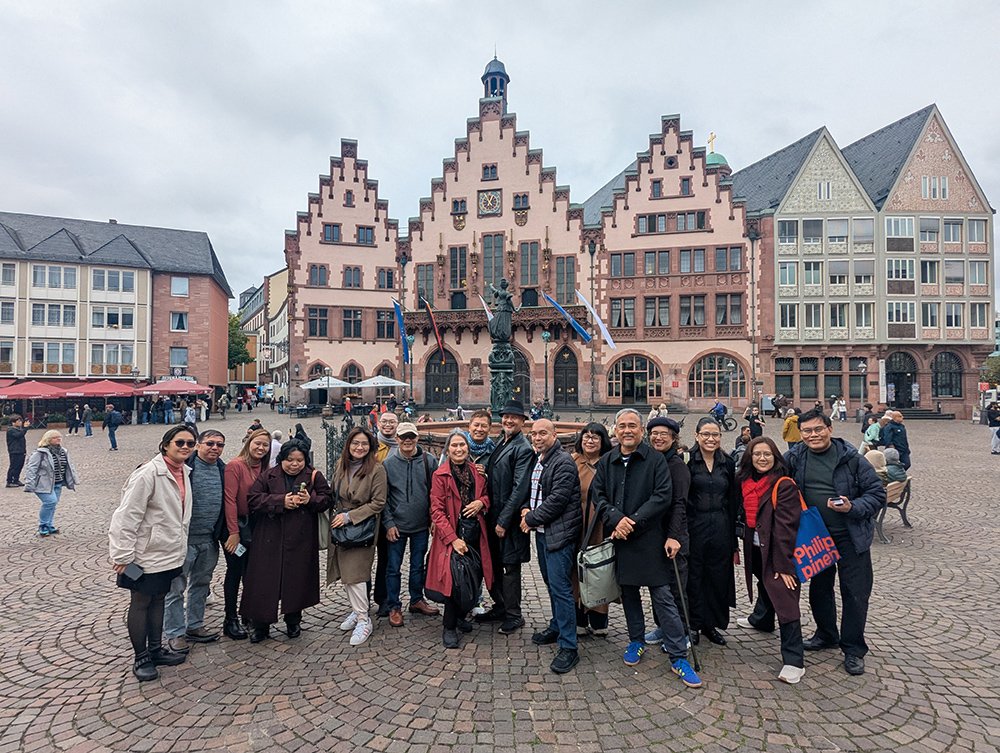Was the Philippines’ Star Turn at Frankfurt Book Fair Worth the Fuss?
/The Philippine Guest of Honor Pavilion was 2,000 square meter space for the main exhibition (Photo from the National Book Development Board)
Last year, I attended the Frankfurt Book Fair, and wonderful things happened: I acquired an agent, met and made new friends, and experienced what the “world’s largest book fair” had to offer.
This year, without any explanation, the National Book Development Board’s (NBDB) application process for individual grants did not take place. Over 100 individuals were chosen, funded, and designated as the core literary team without this application process.
I was not funded, although I was one of the 400 delegates who went to Frankfurt. I had an actual purpose for being there because nine foreign publishers, who had been approved for translation subsidy grants under the NBDB program, would be at the Book Fair with 12 translations of my work. I made arrangements to go on my own.
The Frankfurt Book Fair
Since 1949, the Frankfurt Book Fair has been held in Frankfurt, Germany, as a trade show where attendees meet to conduct the buying and selling of book rights (publication rights, foreign rights, film rights, and other subsidiary rights).
Group of writers at the New Old Town of Frankfurt. (Photo from the National Book Development Board)
The event, known as the largest book fair in the world, runs for five days in October, in an area of around 400,000 square meters, and is said to have around 240,000 visitors. The first three days are for trade, exclusively for publishers, literary agents, and scouts; this is when the buying and selling of rights, as well as business deals and connections, are made. The last two days are open to the public, at which time most of the agents and publishers have left, and visitors can attend book talks, book sales, and author signings.
Philippine participation in the Fair started in 2015, driven primarily by Karina Bolasco, Neni Sta. Romana Cruz, and Ani Almario. Senator Loren Legarda’s involvement brought in the assistance of agencies such as the National Commission for Culture and the Arts (NCCA), the NBDB, and the Department of Foreign Affairs. Charisse Aquino-Tugade was Executive Director of the NBDB when the Philippines became Guest of Honor in 2025.
Cecilia Brainard with some of her foreign publishers and literary agent, celebrating the publication of 14 translations of her novels and Selected Short Stories, left-right: Filip Batkoski (Bata Press, North Macedonia), Senja Pozar (Literary Agent), Cecilia Brainard, Nenad Saponja (Agora, Serbia), Mohamed Radi (Egyptian Office for Publishing and Distribution, Egypt), Leonardo Garzaro (Editora Rua do Sabão, Brazil), and Dejan Trajkoski (Prozart Media, North Macedonia).
Every year, the Fair selects a Guest of Honor country from among applicants. The Guest of Honor program allows showcasing the country’s literature and culture to a global audience, boosting international rights sales and creating connections.
One of the perks is the use of a pavilion, a huge space in the Fair complex. It is up to the Guest of Honor to design and decorate this space, which serves as the center of the country’s main activities. The Philippine pavilion was designed by Stanley Ruiz and curated by Patrick Flores. Local materials like capiz, bamboo, and pineapple fabric were used.
There were separate modules scattered around the huge space, meant to represent islands in the Philippines, but which (in my opinion) left a lot of empty space and a lack of focus. The color scheme was beige, making me think of the desert more than the tropics.
Aside from the pavilion, the Philippines had additional booths and spaces, such as the Philippine Stand and the Comics Stand.
Philippine Stand was 300 square meters dedicated to showing titles for rights selling and distribution. (Photo from the National Book Development Board)
The Boycott
A major issue affecting the Philippine delegation was the call to boycott the Frankfurt Book Fair by organizations allied with the BDS (Boycott, Divest, Sanction) movement for a Free Palestine.
There is a backstory to this: in 2023, the award ceremony at the Fair for the Palestinian author Adania Shibli was postponed because of the Israel-Hamas war. Initially, Fair Director Jörgen Boos issued a statement expressing “complete solidarity on the side of Israel” and said the fair would give Israeli and Jewish voices special visibility. Boycotts, withdrawals, and condemnation followed his statement, and he later issued a new statement emphasizing his sympathy for innocent people in both Israel and Palestine.
This year, because the Israel-Hamas hostilities continued and even escalated, some Filipino writers and publishers announced a boycott in solidarity with the Palestinians. This matter caused a rift among Filipino literary circles. Some who were slated to attend the Book Fair dropped out; others stayed. Most delegates didn’t have an opinion about the boycott; some compromised by trying to give voice to Palestinians at the Fair, while others defended their presence.
Dr. Oscar V. Campomanes, a professor at Ateneo de Manila University, making clear that his views and sentiments are his alone, explained his position to boycott the Fair:
“I have been actively supporting the BDS (Boycott, Divest, Sanction) movement for a Free Palestine since its inception two decades ago, in every way I can; so when the call for a Philippine boycott of the 2025 Frankfurt Book Fair was issued some months ago, by some organizations allied with BDS, against the backdrop of Israel’s harrowing and ceaselessly genocidal campaigns in Gaza, I immediately expressed personal support for it and advocated actively for this action myself, along with so many conscientious colleagues.
“There is nothing to explain about this position, and one will have to be plain-spoken about it. The unshakable complicity of this institution (Frankfurt Book Fair) and Germany with the pariah and rogue state of Israel, with its relentless displacements of an unparalleled brutal violence against the Palestinian people, not just in Gaza but also in the West Bank and other Occupied Territories, is simply indisputable (both complicit institution and country do not deny nor apologize about it; indeed, they openly avow it.)”
A major issue affecting the Philippine delegation was the call to boycott the Frankfurt Book Fair by organizations allied with the BDS (Boycott, Divest, Sanction) movement for a Free Palestine.
Allan N. Derain (delegate, Assistant Professor at Ateneo de Manila University, and author of Iskrapbuk and Aswanglaut, which has been translated into German) was involved in the production of The Lament of Rizal’s Most Miserable Female Story, a play that he co-wrote with Rowena Festin. The play, he said, was the most effective conveyor of the “stands our small group wants to carry—our stand on Duterte’s drug war, the call for an end to the genocide in Gaza, and the plight of literacy among students in the midst of such a celebration in the books.”
Derain sent a statement: “My stand regarding the GOH and the question of Palestine has been to boycott the FBM. However, with situations that would involve having to honor book contracts, or the need to support our translators and publishers, even the Philippine stand, engagement from within would be another way to protest against the genocide in Gaza and a form of solidarity with Palestine…. Whatever form our protest and solidarity takes, it's clear to me that it cannot be business as usual. Our writing and art form is not separate from the kind of world we are in now.”
Jose “Butch” Dalisay (author of translated novels Killing Time in a Warm Place and Soledad’s Sister) has written extensively explaining why he did not boycott the Fair. In his Qwertyman blog of May 25, 2025, he writes:
“In the end, this will come down to an individual act of conscience, however one decides, for which we must reserve our respectful acceptance. Whether one goes or stays, one’s reasons or motives have to be clear, so the gesture will not be wasted. I will go to Frankfurt proudly, with neither guilt nor shame, to speak about our people and our struggles for freedom through my books. Engagement, not withdrawal, will be the best service writers can perform for their country and for all oppressed and silenced people everywhere.”
Historian Ambeth Ocampo said: “We have to think bigger than the books. The Philippine participation in the Frankfurt book fair is a nation-branding exercise—a bridge to the world showing we have publishers, creatives, and writers. Talking to the world about your country is also talking to your country.”
Economic Question
The purpose of the Frankfurt Book Fair Guest of Honor program is to promote a country's literature and publishing industry on an international stage, with a specific focus on increasing translations and international licensing trade. It is also a platform to showcase the country's culture through cultural and literary programs and special exhibitions.
Because the Fair is primarily a trade event, past Guests of Honor have not invested in bringing many authors to Frankfurt. Indonesia had 70 authors. Canada had 58 authors and illustrators. Slovenia had 75 authors, poets, philosophers, and translators.
By contrast, the Philippines had around 400 delegates. (To clarify, while about 400 Filipino “delegates” attended the Fair, only a group of over a hundred “grantees” were funded. The rest paid their own way.) While Filipinos enjoyed the celebratory atmosphere, the result was that many did not have active roles in the event.
The Philippines did have numerous book talks, panel discussions, film screenings, concerts, exhibitions, and performances—including karaoke, hip-hop, and the “Jeepney Journey,” a mobile stage on Rossmarkt Square that hosted workshops and provided cultural exchange in an urban setting. Events occurred before and after the five-day Fair and were located both inside and outside the Fair complex.
The iconic jeepney was situated at the Rossmarkt with a stage nearby and Filipino food stalls. (Photo from the National Book Development Board)
As far as translations are concerned (the end-all at the Frankfurt Book Fair), the current information available shows 185 translation projects from the period 2024–2025, including 34 German editions. It should be noted that German titles were the only ones that received active promotion at the Fair.
As for the monetary cost, and as I understand it, the Philippines paid approximately 186 million pesos to be the Guest of Honor at the 77th Frankfurt Book Fair.
Some expenses included: grantees’ plane fare and housing – 20 million pesos; German press coordinator – 7 million pesos (this German entity was in addition to the press teams of the NBDB, NCCA, and Senator Legarda); pavilion – 68.4 million pesos; Philippine Stand – 5.5 million pesos; Comics Stand – 1.2 million pesos.
Various Anonymous Feedback
Rosie Sula, the T’boli epic singer who performed at the opening ceremony. (Photo from the National Book Development Board)
• The NBDB does not seem to have a conflict-of-interest policy. Several Philippine publishers and authors were hired by the NBDB to be part of the Guest of Honor core team and continue to be on the government payroll. Many received substantial grants—covering translations, travel to international book fairs, Asian rights fair implementation, and publication projects, among others. Their respective organizations also received funds as co-implementors.
• Foreign publishers who were awarded translation subsidy grants are not paid on time. One publisher understood he would be paid a larger amount but was told he would get less because the novel was for young adults.
• There was no clearly published criterion for selecting the Philippine delegation. The lack of transparency made it appear that certain “favorites” were arbitrarily chosen to join the FBM delegation.
• A broader inclusion of Filipino authors in the diaspora could have brought in more diverse and alternative perspectives on what Philippine literature is.
• A lot of money seems to have been spent on comics and graphic novels (separate booths, foreign trips, for example) more than on other genres.
• More than 20 press and media representatives were funded by both the NCCA and NBDB. In addition, a German media company was also paid to handle publicity and press relations.
• The press team of 20 highlighted just a few individuals, at times repetitively, instead of providing broader coverage of events, authors, and creatives at the Fair.
• Some self-funded prominent authors who went to Frankfurt were not acknowledged. The request of a publisher of a small press, who flew in from the US, to display the books he had brought was initially refused.
Maria Ressa, Nobel Prize Winner gave several talks. (Photo from the National Book Development Board)
My Take
I do not have a simple answer to the question: “Was it worth it?”
Regarding the boycott and the inherent moral question, I believe that we human beings must have a space where we can still meet and get along. I believe literature is one such space.
Regarding the cost of 186 million pesos to be Guest of Honor, let me point out this May 2025 article by the Development Aid (United Nations) https://www.developmentaid.org/news-stream/post/195634/education-crisis-in-philippines:
“According to the Philippine Statistics Authority’s Functional Literacy, Education and Mass Media Survey (FLEMMS), 24 million Filipinos aged 10–64 are functionally illiterate, with 5.8 million being basically illiterate. Even more alarming, one in five high school graduates in 2024 were functionally illiterate, with over 18.9 million struggling with basic skills such as reading, writing, arithmetic, and comprehension.”
This information warrants careful consideration when allocating government funds for literary and cultural programs. After all, our children are the future of our country.
Some sources:
The Bookseller Editorial Team. “FBF’s Boos Makes New Statement on Israel-Gaza Conflict “to dispel misunderstandings.” The Bookseller, October 17, 2023, https://www.thebookseller.com/news/fbfs-boos-makes-new-statement-on-israel-gaza-conflict-to-dispel-misunderstandings.
Cu Unjieng, Philip. “From Manila to Frankfurt: The Philippines’ Moment on the World Literary Stage.” Metro Style, Oct. 19, 2025. https://metro.style/culture/2025/10/19/from-manila-to-frankfurt-the-philippines-moment-on-the-world-literary-stage-1841.
Dalisay Butch. “Best Foot Forward in Frankfurt.” The Philippine Star, Oct. 5, 2025. https://philstarlife.com/geeky/131456-best-foot-forward-frankfurt?page=5.
Denya, Tadios Sokomondo. “The Cost of Illiteracy: Why the Education system in the Philippines is failing millions.” Development Aid, May 21, 2025. https://www.developmentaid.org/news-stream/post/195634/education-crisis-in-philippines.
Esquire Philippines. “Filipino Writers and Publishers React to the Call to Boycott the Frankfurt Book Fair 2025.” Esquire Philippines, June 5, 2025, https://www.esquiremag.ph/culture/books-and-art/frankfurt-book-fair-boycott-filipino-writers-publishers-statements-a1057-20250605-lfrm2.
Wang, Mel. “Filipino Publishers Clasp over Palestine at the World’s Biggest Book Fair, Rolling Stone.” Rolling Stone, Oct. 7, 2025, https://rollingstonephilippines.com/culture/books/frankfurt-book-fair-boycott-for-palestine/.
Cecilia Manguerra Brainard is the award-winning author and editor of over 22 books, including the novels: When the Rainbow Goddess Wept, Magdalena, and The Newspaper Widow, and her Selected Short Stories. Her work has been translated into 11 languages.
She has received an Outstanding Individual Award from her birth city of Cebu, a California Arts Council Fellowship, travel grants from the US Embassy and the National Book Development Board, National Book Award, Cirilo Bautista Prize, among others. She runs a small press, PALH or Philippine American Literary House.
More articles from Cecilia Manguerra Brainard










